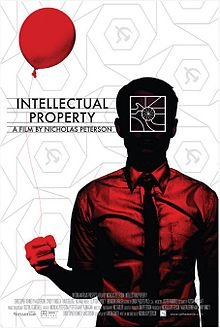|
This compilation is provided you with compliments of the
IP Professor List hosted by the UNH School of Law.
|
 |
|
Title |
Replies |
Name |
School/ Law firm |
|
THE SPANISH PRISONER |
There aren't very many, but i.p. protection (and theft) plays a significant role in David Mamet's THE SPANISH PRISONER (even though his dialogue gets some of the terminology wrong). |
Robert C. Cumbow |
Graham & Dunn PC |
|
The Social Network (2010)
Flash of Genius (2008)
The Prestige (2006)
|
|
Sourabh Vishnubhakat |
|
|
The Third Man |
The Third Man, of course. Counterfeit drugs. |
Andrew W. Torrance |
Professor of Law | Faculty Senate President | University of Kansas
Visiting Scholar | MIT Sloan School of Management
|
|
The Spanish Prisoner |
The Spanish Prisoner is a great movie but has one of the worst manglings of IP I've seen. |
Mark A. Lemley |
Stanford Law School
Durie Tangri LLP
|
|
The Devil wears Prada
Logorama (documentary)
|
For those who want an immersion in the world of fashion brands, and why they matter so much to some, The Devil Wears Prada is a good movie as well. The documentary Logorama (you can get it on YouTube, at least until last month) is a perfect short movie, 20 minutes, that you can show also in class as example of artistic (fair, I believe) use of marks.
There are also movies that include parodies of parts of other movies or that recall parts of other movies, like the Naked Gun movies, the Austin Powers movies, or some cartoons, like The Wild (a mix of The Lion King and Madagascar 1, for example).
|
Dr. Irene Calboli |
Professor of Law, Marquette University Law School
Visiting Professor, Faculty of Law, National University of Singapore |
|
Night At the Opera |
A bit off point but not completely:
The contract scene from Night At the Opera:
The contract scene between Driftwood and Fiorello ("the party of the first part ..."): Fiorello: Hey, wait, wait. What does this say here, this thing here? http://www.youtube.com/watch?v=L_ALYkBIF-4
|
||
|
The Last Station (about the copyrights and estate of Leo Tolstoy) |
|
Faculty Member, Columbia Law School and Munich Intellectual Property Law Center |
|
|
|
|||
|
Western New England University
|
|||
|
|
(2) Sneakers (http://www.imdb.com/title/tt0105435/), more about espionage and security, is just an all around fun and engaging film to watch. (3) My favorite takes on IP are in various episodes of The Simpsons. There is a classic episode involving the litigation over ownership in the Itchy & Scratchy copyright. And another episode involving Homer's patenting a method for curing back problems. These episodes were better than any of the movies I have seen dealing with similar issues, but that's not saying much. (4) Really going back: an old Dick Van Dyke episode from the 1960's involving copyright over a song Rob Petrie wrote before becoming a TV show writer. (5) My favorite IP related scene is in The People v Larry Flynt. I have played it before teaching the Ninth Circuit fair use case. Here is my paper reenactment. Falwell's attorney: Flynt is countersuing.
There are a lot of good documentaries on the IP industries. But nothing says it better than that scene.
Another film: The Constant Gardener from a few years back.
It still strikes me that Ribstein's point about corporations in film applies equally to IP in film. What the heck I guess IP owners wear the black hat, corrupt the innocents, and trample on the little guy.
|
|
|
|
https://en.wikipedia.org/wiki/Redbelt |
|
||
|
Don't think this one was mentioned yet: |
|||
|
|
The Greatest Movie Ever Sold http://www.imdb.com/title/tt1743720/
|
|
|
|
|
|||
|
|
I don't think these have been mentioned: The Hudsucker Proxy and Meet the Robinsons. |
The Ohio State University, Michael E. Moritz College of Law
|
|
|
|
Of course, today all of that information would certainly already be on an agent's cell phone. The movie's also noteworthy for the scene in which Jerry belatedly realizes that he should have gotten a signed agency agreement, instead of an oral commitment, from a star player's father.
|
||
|
|
|||
|
|
For a more recent film you might try Music and Lyrics (2007) with Hugh Grant as a composer living comfortably but aimlessly off royalties from his one hit song, a popular Christmas ditty he has grown to hate. Drew Barrymore plays the redemptive love interest who helps Grant grow up.
|
||
|
Andrew, once you compile a list of IP movies, could you share it with the list?
|
Associate Professor of Law |
||
|
|
|||
|
WILL SHAKESPEARE FENNYMAN [the money] HENSLOWE [who owns the playhouse] WILL HENSLOWE
|
|
||
|
|
|
||
|
How could I forget - this is a great English classic:
Alec Guinness in "The Man in the White Suit" (1951)
http://en.wikipedia.org/wiki/The_Man_in_the_White_Suit
|
|||
|
Sadly, the scene in the final cut of the movie isn't as good as the shooting script. Here's the script version:
FRANK (Jackie doesn't seem to understand.) FRANK JACKIE FRANK (That. That's what this is about. Jackie nods, but -) JACKIE FRANK JACKIE FRANK JACKIE FRANK JACKIE FRANK JACKIE FRANK |
|||
|
The Network Effect: How the Software Industry Profited from Piracy (documentary) |
|
Innovation Chair, Electronic Commerce Director, Centre for Innovation Law and Policy Faculty of Law, University of Toronto
|
|
|
|
|
|
|

